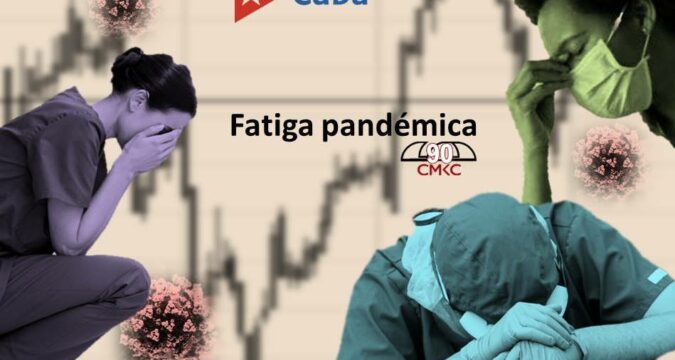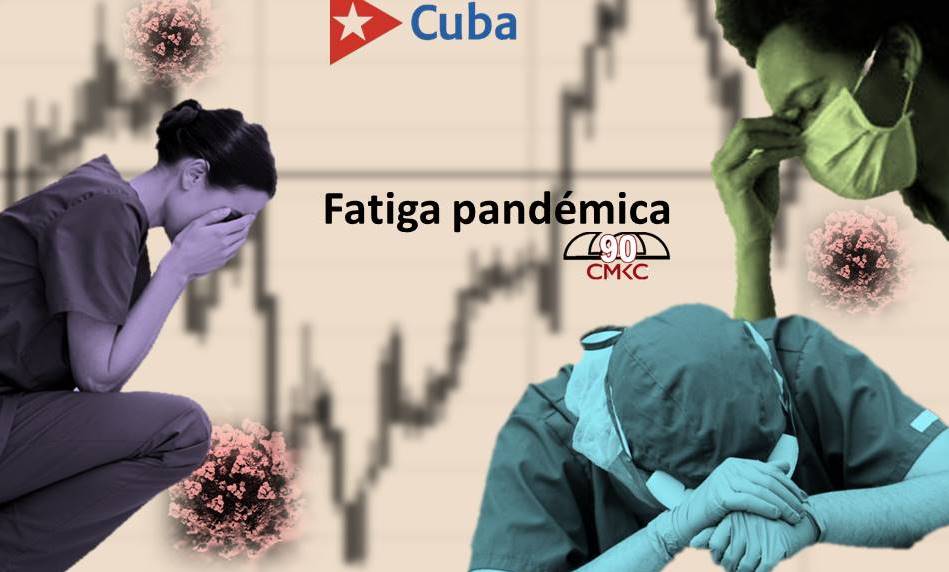

Pandemic Fatigue- Dr. Duran’s news is not good. What else can we do? Psychology professionals are no strangers to sharing the same anxieties; we just have the responsibility to help manage them. The fact is that we are facing a great social paradox, dangerous and difficult. The lethality and contagiousness of the COVID-19 virus is increasing, at the same time that individuals, groups and families are lessening the efforts and psychological energies required to combat it, an issue that is visible in the disregard of family and social discipline.
It is important to explain that it is not a disease, but a psychological state produced by the continuous exposure to a set of stressors, directly related to the possible contagion, to the measures of social restriction and also to the collateral effects of an economic crisis that makes life complex and difficult.
The tiredness reaction to the adversity of the pandemic, sustained and unresolved over time has been termed by the WHO as pandemic fatigue. Scientists state that every pandemic initially produces horror, but if it is maintained over time, it turns into tedium and boredom. It is important to clarify that it is not a disease, but a psychological state produced by the continuous exposure to a set of stress factors, directly related to the possible contagion, to the measures of social restriction and also to the collateral effects of an economic crisis that makes life complex and difficult.
Abdala, with three doses, demonstrates 92.28% efficacy

Cuba Begins Clinical Trial with COVID-19 Vaccine on Children
One person jokingly told me: we are running on «COVID-mode» so much that our battery is running out. The term is also controversial, because it places the nature of the problem in the individual, when in fact the increase in cases is due to multiple causes. I believe that it is not a matter of trying to psychologize the phenomenon, but to offer tools of analysis that help to improve responsibility and strengthen the will.
The human being has a great ability to get used to and lose the capacity for astonishment in the face of any event. When the unprecedented and extraordinary nature of a traumatic event becomes habitual, it causes a defensive decrease in alarm levels. For many people, warnings, health advice and even the announcement of new restrictive measures, after more than a year, already sound like a saturated discourse, a «more of the same» that after so much repetition loses its effectiveness or, in the best of scenarios, they are incorporated more naturally, becoming a daily habit. Monotony takes over everything, flattening the affections and the capacity to reason. This fatigue produces potentially dangerous attitudes, mental schemes, emotions and behaviors. We must be attentive when we feel that it exceeds our control, in order to avoid a major catastrophe.
The decrease in risk perception appears contradictorily as a psychological protection mechanism, a desperate search for a feeling of normality and continuity of life. However, it is very dangerous in these circumstances to become accustomed to fear. In times of COVID-19, it is necessary to be fully aware of the fear of contagion as adaptive resources in our favor, without lowering our guard.
No matter how much one may resist accepting the circumstances reality is there as such, with all its crude reality, and nostalgia. It is important to maintain an attitude of acceptance, which does not mean resignation or passivity, but to develop an active position of discernment of what is in our hands and what we can transform and what transcends us and we have to accept, which allows us to make new adjusted plans to the circumstances.
As restrictions are maintained over time, the desire for autonomy increases, especially in adolescents and young people, a situation that is difficult to manage. The tolerance to frustration overflows, transforming into angry protest in some young people, deprived for a long time of basic needs of contact and socialization. This rebelliousness can be highly dangerous; some adolescents defy their parents’ authority, which requires a lot of persuasion and commitment from them to prevent them from making decisions that put them at risk. In reality today, love and care have reasons, and even reason is not enough to explain what they should understand, but protection and sanity must prevail.
In the midst of a pandemic, mood swings and negative emotions are natural, so we cannot avoid this roller coaster of emotional ups and downs. However, we must learn to accept them and manage them so that irritability, nervousness and discouragement do not end up polluting our environment in a highly toxic climate that affects ourselves and others. It is necessary to pay special attention to the emotions sustained in time, to those that are very frequent and intense. Observe if any incident causes a disproportionate explosion or being very sad every day most of the time. At this point, unless the person is going through bereavement, he/she should consider changing habits or seek professional help.
We observe arrogant attitudes, of some who process information ignoring authoritative suggestions, tendentiously finding arguments that prove them right and selecting information that confirms their conclusions. I have heard assertions such as, «It is bad manners to put on a mask with loved ones.» «After all, if I haven’t been infected by now, it seems that I don’t have the virus». «Let him go to the sleepover, because he’s already got me so upset». «Why so much face mask if we are already vaccinated».
We Cubans have been more accustomed to living through hurricanes, events that are also potentially traumatic, but transitory. The problem with the pandemic is that it runs like a «slow disaster» that seems to have settled in an «eternal present» that never ends. The erosion of time is a factor that hits hard on our psychological health. It is clear that not all individuals and families have experienced this reality in the same way. Although no one escapes its harmful effects, adaptive resources depend on the degree of social vulnerability, the traumatic events experienced, life circumstances and the confluence of several difficult situations. For this reason, public policies are committed to measures that help to alleviate social and economic factors, not only those related to health.
The history of wars, epidemics and natural disasters shows us the best and the worst of human beings. It is only in extreme situations that we truly get to know their essence. In the scenario in which we live we have also discovered in many people their greatness or their misery, some have grown on a personal, family and social level, but others have unmasked themselves, showing a marked predominance of selfishness, greed, mistreatment and lack of sensitivity. We have observed a kind of intertwining between caring solidarity on the one hand and pretending on the other, fortunately a minority of contempt for the life and effort of others.
What does Albert Camus tell us in his famous book The Plague? That the worst epidemics are not biological, but moral. In crisis situations, the worst of society comes to light: selfishness, immaturity, irrationality. But the best of human beings also emerges; there are always the righteous who sacrifice their own well-being to care for others.
The blockade asphyxiates and kills, just like the virus, and must end!
The most guaranteed psychological antidote to pandemic fatigue that I have learned from the people I have been able to interview, and who have managed to surf the great waves of exhaustion and fatigue, is to have developed or strengthened a personal, family and social ethic of solidarity, above all forms of individualism, selfishness and self-centeredness. The unfortunate thing is that only a good education and high moral stature can achieve this, and we are not learning this with the pandemic.
We are alive

Cuba Begins Clinical Trial with COVID-19 Vaccine on Children
It is not difficult to understand that many people feel a horizon of uncertainty about the end of this event. But it is also true that in the midst of this uncertainty we continue to build hope and bet on utopia, both at a personal, family and social level. Mass vaccination and the many aid mechanisms that have been created are signs of this. To combat pandemic fatigue there are no recipes or specific formulas, but life is like music, with a few notes you can achieve a huge variety of beautiful melodies. Play solidarity, respect, dignity, justice, joy for the arts, culture, sensitivity in care, and you will surely begin to hear a song of life, encouragement, peace and hope, despite the fatigue.























